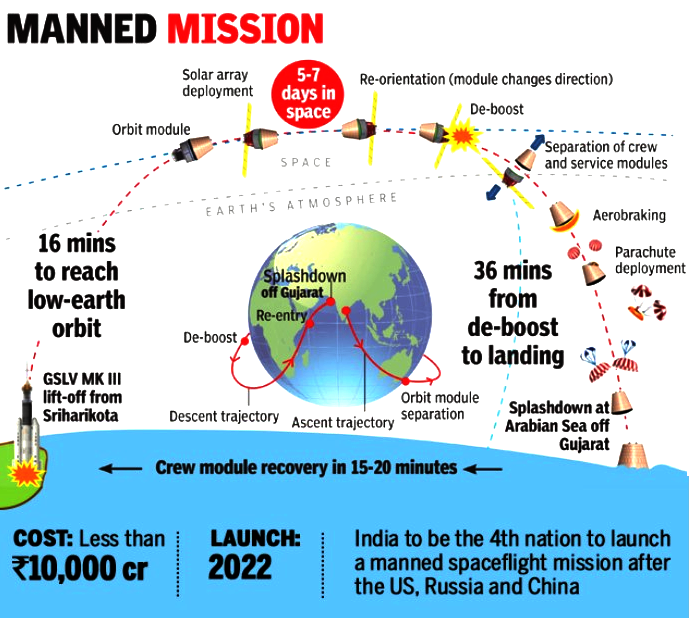Science & Technology
Gaganyaan Mission
- 11 Dec 2021
- 4 min read
Why in News
Recently, the Union Minister of Atomic Energy and Space informed that the crewed Gaganyaan mission will finally be launched in 2023.
- The country's first space station is likely to come up by 2030.
Key Points
- About:
- Gaganyaan is a mission by the Indian Space Research Organisation (ISRO).
- Under the Gaganyaan schedule:
- Three flights will be sent into orbit.
- There will be two unmanned flights and one human spaceflight.
- The Gaganyaan system module, called the Orbital Module will have three Indian astronauts, including a woman.
- It will circle Earth at a low-earth-orbit at an altitude of 300-400 km from earth for 5-7 days.
- With that launch, India will be in the elite club of nations (America, China and Russia).

- Payloads:
- The payload will consist of:
- Crew module - spacecraft carrying human beings.
- Service module - powered by two liquid propellant engines.
- It will be equipped with emergency escape and emergency mission abort.
- The payload will consist of:
- Launch:
- GSLV Mk III, also called the LVM-3 (Launch Vehicle Mark-3,) the three-stage heavy lift launch vehicle, will be used to launch Gaganyaan as it has the necessary payload capability.
- Gaganyaan’s major missions like the test vehicle flight for the validation of crew escape system performance and first uncrewed mission of Gaganyaan (G1) are scheduled during the beginning of the second half of next year (2022).
- This will be followed by the second uncrewed mission at the end of 2022 carrying ‘Vyommitra’, a spacefaring human robot developed by Isro, and finally the first crewed Gaganyaan mission in 2023.
- GSLV Mk III, also called the LVM-3 (Launch Vehicle Mark-3,) the three-stage heavy lift launch vehicle, will be used to launch Gaganyaan as it has the necessary payload capability.
- Significance:
- It will help in enhancement of science and technology levels in the country and help inspire youth.
- Gaganyaan will involve numerous agencies, laboratories, disciplines, industries and departments.
- It will help in the improvement of industrial growth.
- A new organisation, IN-SPACe, part of reforms to increase private participation in the space sector was announced last year (2021).
- It will help in the development of technology for social benefits.
- It will help in improving international collaboration.
- One International Space Station (ISS) put up by multiple countries may not be enough. Regional ecosystems will be needed and Gaganyaan will focus on regional needs: food, water and energy security.
- It will help in enhancement of science and technology levels in the country and help inspire youth.
- Other Upcoming Mission:
- Shukrayaan Venus Mission (For 2023):
- The Shukrayaan orbiter will be the first mission to Venus by the ISRO and will study the planet for four years
- L-1 Aditya Solar (For 2022-23):
- Chandrayaan-3 Missions (For 2022-23):
- The Chandrayaan-3, a follow-up of the Chandrayaan-2 mission, involves “various processes, including finalisation of configuration, subsystems realisation, integration, spacecraft level detailed testing and a number of special tests to evaluate the system performance on earth.
- Shukrayaan Venus Mission (For 2023):






